BMW vs. Audi: A brand race [social listening analysis]

What do you get when you take two major German automobile manufacturers and put them to compete for the same market segments? A brand battle worthy of a social listening analysis for sure.
Although both Audi and BMW are German brands, their rivalry is very much a global issue. Each flagship on either side triggers an ever greater wave of debate while the dilemma remains the same: which brand is better? Questions are being asked, expert opinions are being provided, and yet the Google ranking algorithm is the only one with a definitive answer.
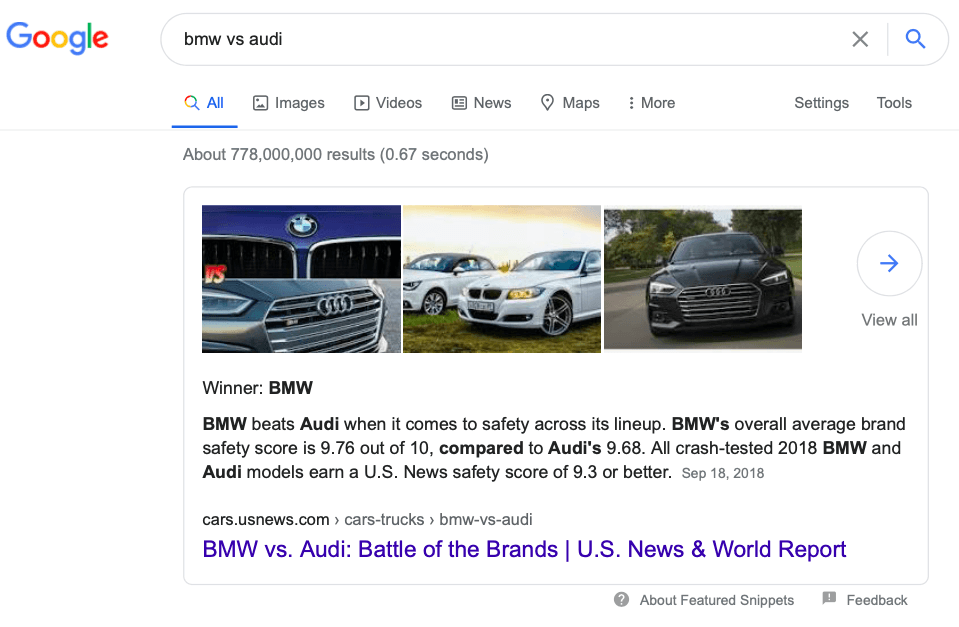
For the human rest of us, the eternal question remains. Seeing how no amount of discussions have led to a universally acknowledged winner, we thought we'd try and determine which car brand wins more customer hearts by running a social listening analysis with our own social media monitoring and analytics tool Awario.
The way Awario works is by monitoring social networks 24/7 for all mentions of any keywords — BMW and Audi in this case — to then display mentions analytics and give us the insights required to name the winner of this brand battle.
- Which brand gets more mentions on social media?
- Which brand has a bigger reach?
- Which brand gets the most positive mentions?
- Which brand has bigger influencer support?
- Which brand generates higher online engagement?
All of these are the questions we can answer by conducting a social listening analysis. And that's exactly what we did.
By signing up I agree to the Terms of Use and Privacy Policy
Ready Steady Go!
6 months ago, we fired up monitoring of all mentions of Audi and BMW on Twitter, Instagram, Facebook, YouTube, and Reddit. Because we were interested in brand mentions with specified locations, we used Boolean search to create queries that'd bring us geotagged mentions only.
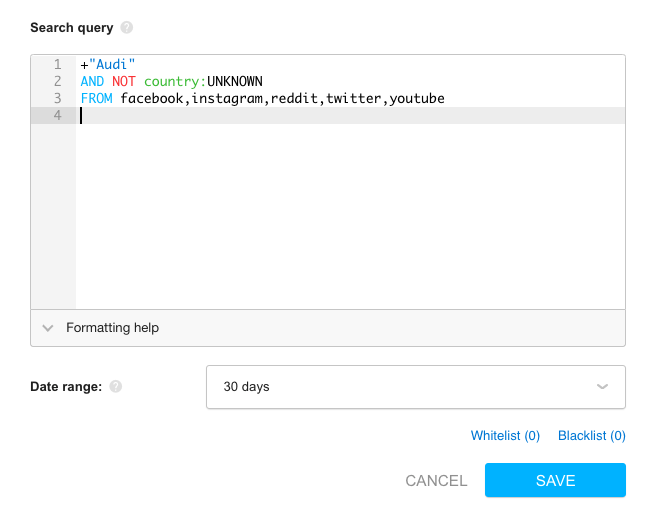
Pro tip: use AND NOT country: UNKNOWN to exclude all mentions from unspecified locations. With these settings, Awario will only search for geotagged mentions that you can then map out.
Afterward, we created the same kind of Boolean query for BMW. As soon as Awario was done collecting social data, we moved over to the Dashboard and reviewed all social listening metrics one by one. Let's see what we got.
Share of voice
Share of voice is the social listening equivalent of market share. It reflects the total number of brand mentions benchmarked against the total number of mentions of another brand. A bigger share of voice indicates a bigger brand awareness and, therefore, a bigger market share.
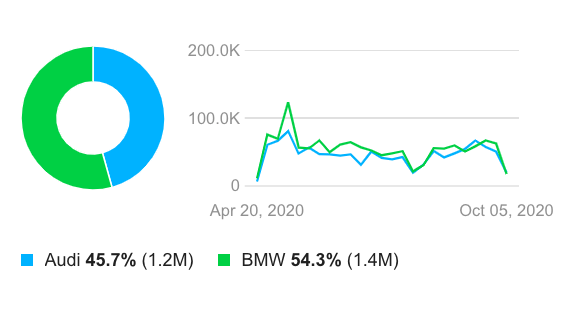
As you can see, both Audi and BMW have generated a good share of social media discussions each. Over the past 6 months, there have been 1.2M mentions of Audi and 1.4M mentions of BMW, which is a rather even division with an advantage on BMW's side.
Reach
Once we've assessed the volume of conversations around each brand, we can look at the reach of brand mentions. Reach is a social listening metric that corresponds to online visibility and brand recognition. In the context of this analysis, reach reflects the number of times social media users have been exposed to the brand names Audi or BMW over the past 6 months. The audiences might not have engaged with the mentions but they have seen them in their social media feeds.
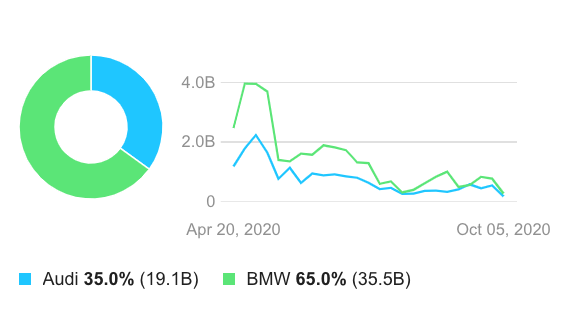
This is where BMW wins by an even bigger margin. With less than a 10% difference in the volume of branded conversations, the gap in terms of reach is 30%. This means that although Audi and BMW received a more or less equal number of mentions, BMW's mentioners have bigger accounts with more followers and larger exposure on social media. As a result, mentions are visible to more people and the brand's online visibility keeps growing.
Sentiment
Sentiment analysis is the social listening way of telling how much of the audience's online feedback is positive and how much of it is negative. Social listening tools like Awario can tell positive, negative, and neutral mentions apart. We're usually interested in explicitly positive and negative mentions only, as they give us more insights into brands' perception.
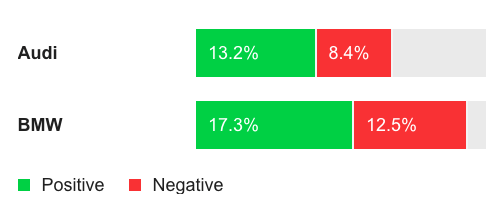
Both for Audi and BMW, the majority of branded social media conversations are neutral in tone. As far as explicitly positive and negative mentions go, the shares are 13.2% vs. 8.4% for Audi and 17.3% vs. 12.5% for BMW. To make better sense of these numbers, we can calculate Net Sentiment.

Using this formula, we can determine that Audi's net sentiment is 13.2 - 8.4 / 13.2 + 8.4 = 22%. Meanwhile, BMW's net sentiment is 17.3 - 12.5 / 17.3 + 12.5 = 16%. This makes Audi the winner on the sentiment field.
Influencers
Influencer marketing is a way for brands to expand their reach and win the trust and support of new market segments. Brands as big as Audi and BMW enjoy plenty of influencer support, with most of it coming not from established brand ambassadors but unrelated social media accounts with big followings.
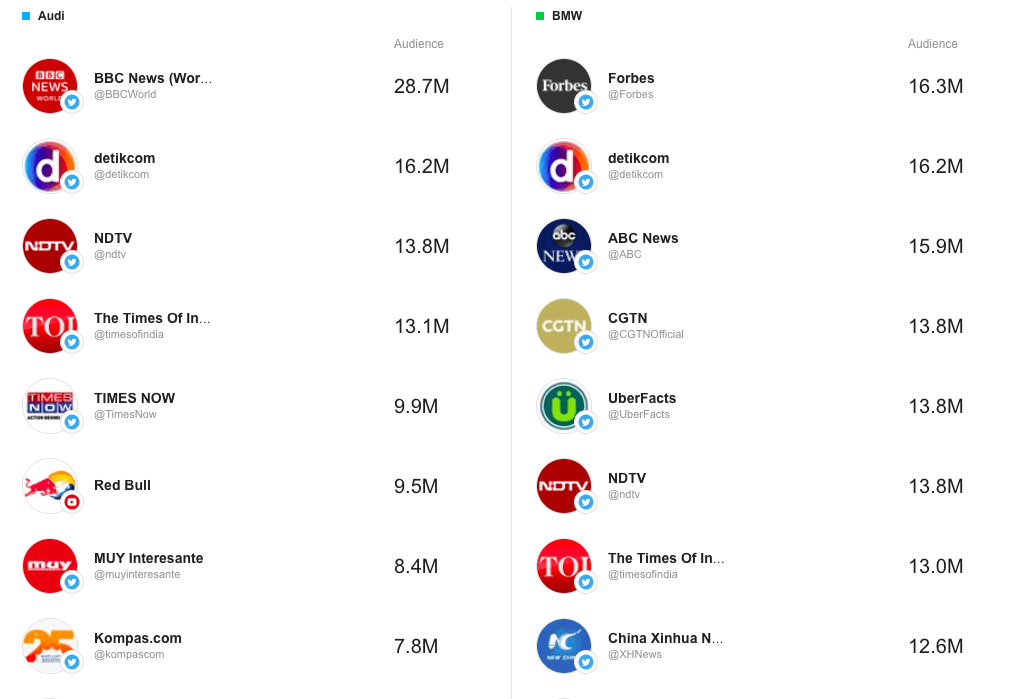
At first glance, both Audi's and BMW's biggest influencers are more or less of the same caliber. They're mostly news outlets and online publishers, with singular appearances from brands like Red Bull. You might have noticed that Audi's biggest influencer is BBC News (World) with 28.7M followers on Twitter alone. And yet the overall reach of Audi's brand mentions is smaller than that of BMW's.
If we take a closer look at the mentions and the types of engagement they have generated, we see right away that the spotlight was given to a piece of news centered on an Audi ad.
"We sincerely apologize for this insensitive image and ensure that it will not be used in future"
— BBC News (World) (@BBCWorld) August 4, 2020
Audi drops girl with banana ad that sparked criticism https://t.co/DuNbNsNGnY
The ad features a red Audi vehicle, a child leaning against it and holding a banana, and a slogan "Lets your heart beat faster - in every aspect." The ad was deemed ambiguous and inappropriate by a part of Audi's social media audience, resulting in an apology posted by the company shortly after.
We hear you and let’s get this straight: We care for children. The Audi RS 4 is a family car with more than thirty driver assistance systems including an emergency break system. That’s why we showcased it with various family members for the campaign. (1/3)
— AudiOfficial (@AudiOfficial) August 3, 2020
This minor case of a reputation crisis did not leave any major stains on the company's mostly positive online image. Later in this article, you'll see why. Meanwhile, the total reach of all influencers that have mentioned BMW in the past 6 months ended up outweighing Audi's by a large margin.
Audience
If we look at audience analytics for Audi and BMW, we can see that both brands are fully global on social media as much as in the physical world.

Only a third of all mentions of Audi on social media over the past 6 months have been in English. Then go Spanish, French, Indonesian, Japanese, German, and Italian. BMW, meanwhile, has had a little under half of its mentions composed in English. The rest have been posted in the same languages as Audi's, only with different shares.
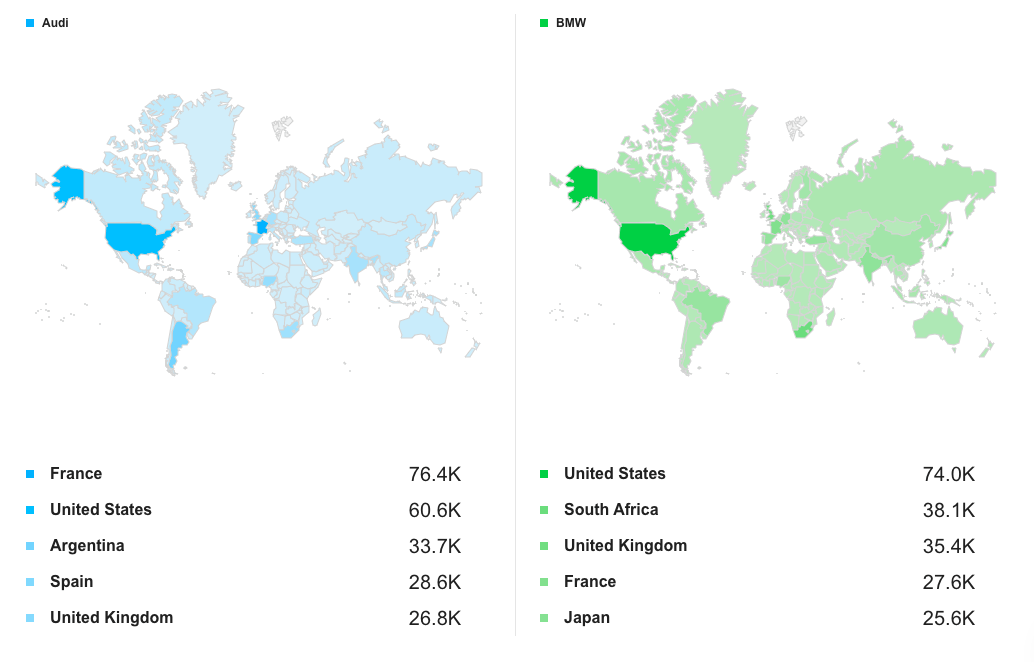
In terms of top-5 user counties, the situation is even more interesting. Audi's biggest user location turned out to be France, followed by the U.S., Argentina, Spain, and the U.K. Mentions of BMW in the past 6 months came mostly from the U.S., South Africa, the U.K., France, and Japan.

Hardly a surprise for anybody, but social media audiences of both car manufacturers are mostly male. Audi's share of female mentioners is a little larger (28.9% vs. BMW's 24.5%) but the big picture remains the same.
User engagement
We've looked at all kinds of social media analytics and insights to compare Audi and BMW as seen by their global social media audiences. Let's now dive into mentions per se, i.e. examine the social media posts and the engagement they have generated. For this, we move over to the Mentions feeds by clicking on the entirely interactive dashboard.
The Topic cloud is one of the clickable fields that can take us to the mentions behind analytics. Both Audi's and BMW's topic clouds are a bit of a mess because we set Awario to collect brand mentions in all languages. However, we can still see trends and popular keywords, all of which are clickable in case we want to examine the social media posts behind the analytics.
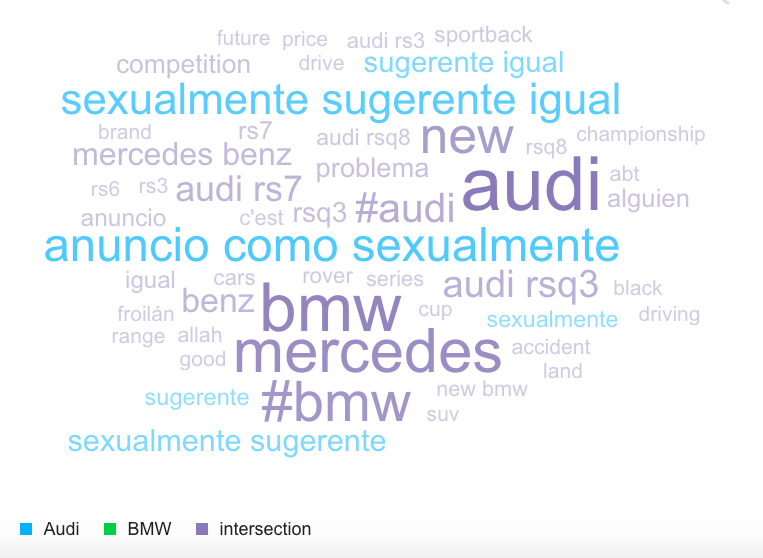
Audi's biggest keywords highlighted in blue have to do with the ambiguous ad we talked about earlier in this article. Following a wave of criticism on social media, a lot of users, particularly Spanish-speaking, took Audi's side by standing by a comment posted by a minor personal account suggesting that the problem might not be with the ad but the people seeing the ambiguity.
Si alguien ve este anuncio como sexualmente sugerente igual el problema no lo tiene Audi... no? ? https://t.co/7BCS9AjZOl
— Bea Arias (@BeaAriasGar) September 16, 2020
This is the magic of crisis management in the age of social media. A wave of public outrage at a post is mitigated by an individual, not even a micro-influencer, who stepped forward and flattened the curve of criticism by posting something a large chunk of the brand's audience can stand by. This is the type of brand loyalty that takes decades to cultivate.
Speaking of solidarity and customer loyalty, let's search for the ultimate, universal manifestations of brand equity — posts featuring the indisputable > symbol to indicate which brand wins. Below are examples of the posts I'm talking about.
Sorry but Audi>BMW https://t.co/EAUSPWoehU
— Cause I'm Only a Crack-Zeynep (@NobleLion1905) September 1, 2020
Bmw>audi
— Reçel ??♀️ (@kimsordu) August 25, 2020
All you need to do to uncover these posts is use the Mentions feeds' filtering options. You can also switch between different types of grouping and search the mentions for any words or symbols, which is what we did to fetch the posts featuring the > symbol alongside the brand names.
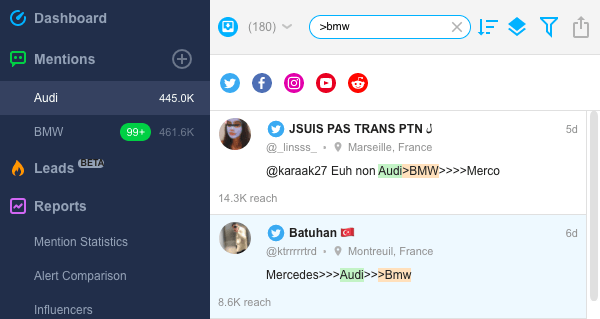
One thing we can see right away is the prominent presence of Mercedes — another leading German car manufacturer that wasn't a part of this analysis. However, we can still compare the number of times Audi and BMW were indicated as superior brands in relation to one another.
Audi>BMW appeared in the mentions 180 times, while BMW>Audi was used only 20 times. Whether or not this can be deemed a reliable indicator of customer's preferences is for you to decide. But in harsh social media terms, Audi emerges as the better-liked brand within this category of comparison.
Finish line
We used social listening to analyze conversations around Audi and BMW and determine which brand wins the social media game. Here's what we found out.
- BMW is mentioned the most, it also has the highest online visibility.
- Audi has a better net sentiment, which makes it a better-liked brand.
- BMW boasts bigger influencer support.
- Audi wins in terms of online user engagement.
Whatever Google's featured snippet for BMW vs. Audi wants you to believe, social media has its own opinions, as long as you're willing to listen.
You're welcome to test-drive Awario and dive deeper into the subject — or run a social listening study from scratch. Whatever analyses you have in mind, make sure you try social listening and see what insights it can deliver.
By signing up I agree to the Terms of Use and Privacy Policy













